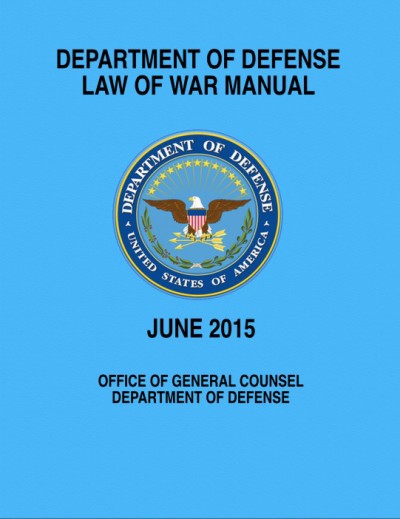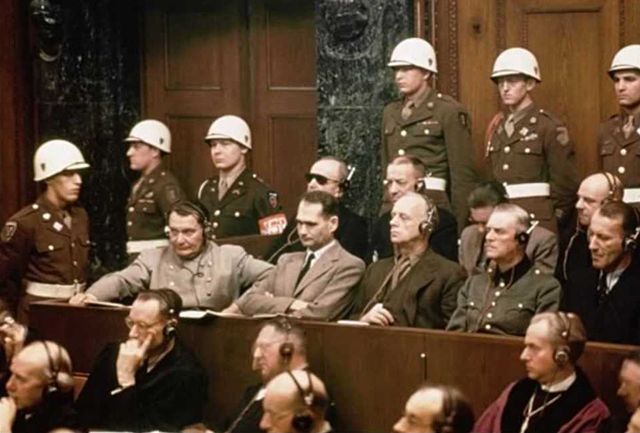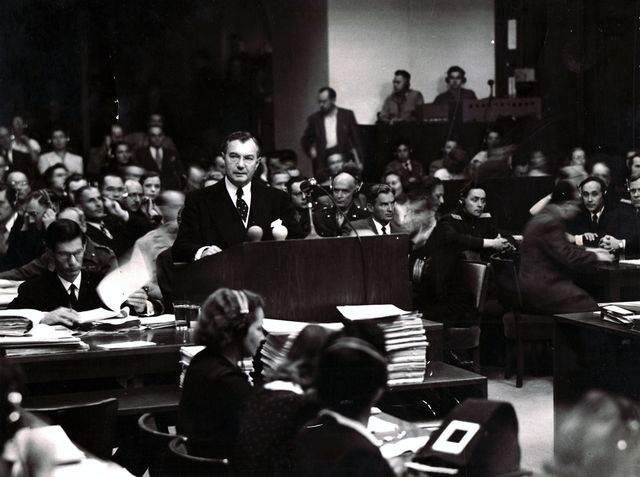The Pentagon’s Law of War Manual: A Guidebook for Violating International and Domestic Law
Part I

The new US Department of Defense Law of War Manual is essentially a guidebook for violating international and domestic law and committing war crimes. The 1,165-page document, dated June 2015 and recently made available online, is not a statement of existing law as much as a compendium of what the Pentagon wishes the law to be.
According to the manual, the “law of war” (i.e., the law of war according to the Pentagon) supersedes international human rights treaties as well as the US Constitution.
The manual authorizes the killing of civilians during armed conflict and establishes a framework for mass military detentions. Journalists, according to the manual, can be censored and punished as spies on the say-so of military officials. The manual freely discusses the use of nuclear weapons, and it does not prohibit napalm, depleted uranium munitions, cluster bombs or other indiscriminate weapons.
The manual might have more properly been titled A Manifesto for Total War and Military Dictatorship.
The manual is an expression of the incompatibility of imperialist militarism and democracy. In the 25 years since the liquidation of the USSR, and especially over the 14 years since the launching of the so-called “war on terror,” the United States has been almost perpetually at war, seeking to offset its economic decline by threats and military violence around the world.
The same government that orchestrated a coup led by fascists in the Ukraine, that backs a military dictatorship and repression in Egypt, and that supports mass killings and destruction in Gaza can hardly be expected to remain true to the rule of law and democratic principles at home.
Through both the Bush and Obama administrations, the “war on terror” has been accompanied by a steady abrogation of democratic rights within the United States, including a barrage of police state legislation such as the Patriot Act, unrestricted spying on the population by the National Security Agency and other agencies, the militarization of the police, and the establishment of precedents for the detention and assassination of US citizens without charges or trial.
In this context, the Pentagon manual is a significant milestone in the drive to establish the framework of a police state.
In his farewell address in 1961, President Dwight D. Eisenhower famously warned about the dangers posed by the “military-industrial complex.” But America’s current military-corporate-intelligence establishment has metastasized far beyond anything Eisenhower could have imagined. Bloated with unlimited cash, dripping with blood from wars of aggression, it boldly announces its independence, its hostility to democracy and the rule of law, and its readiness to carry out war crimes and other atrocities at home and abroad.
The Pentagon manual reflects international imperialist tendencies. Its authors state that it “benefited from the participation of officers from the United Kingdom’s Royal Air Force and the Australian Royal Air Force on exchange assignments with the US Air Force.” They continue: “In addition, military lawyers from Canada, the United Kingdom, New Zealand, and Australia reviewed and commented on a draft of the manual in 2009 as part of a review that also included comments from distinguished scholars.” (P. v)
The manual, which “reflects many years of labor and expertise,” applies to the entire Department of Defense, which includes the Army, Navy, Air Force, Marine Corps, four national intelligence agencies including the NSA, and numerous other subordinate departments and agencies, totaling 2.13 million active duty personnel and 1.1 million reservists. The manual notes, “Promulgating a DoD-wide manual on the law of war has been a long-standing goal of DoD lawyers.” (P. v) The new document supersedes various policy documents that had accumulated piecemeal within different sections of the military and intelligence agencies.
It is the outcome of a continuous effort through both Democratic and Republican administrations over a long period, including the Bush and Obama administrations. It was issued at the highest levels of the state, having been prepared by a “Law of War Working Group” that “is chaired by a representative of the DoD General Counsel and includes representatives of the Judge Advocates General of the Army, Navy, and Air Force; the Staff Judge Advocate to the Commandant of the Marine Corps; the offices of the General Counsels of the Military Departments; and the Legal Counsel to the Chairman of the Joint Chiefs of Staff.” (Pp. v-vi)
The Pentagon general counsel is Stephen W. Preston. Preston was general counsel of the Central Intelligence Agency (CIA) from 2009 to 2012, during which time the CIA covered up its own war crimes and obstructed efforts to investigate its illegal torture program. It is unclear to what extent the manual has been reviewed or approved by any civilian authority.
The significance of Nuremberg
The Law of War Manual is replete with references to the Nuremberg proceedings, a complex and significant event in the history of the post-World War II period and the history of international law. The manual opens with this tribute:

Image: Nuremberg tribunal
“After World War II, US military lawyers, trying thousands of defendants before military commissions, did, in the words of Justice Robert Jackson, ‘stay the hand of vengeance and voluntarily submit their captive enemies to the judgment of law’ in ‘one of the most significant tributes that Power has ever paid to Reason.’ Reflecting on this distinctive history, one chairman of the Joint Chiefs of Staff observed that ‘[T]he laws of war have a peculiarly American cast.’ And it is also true that the laws of war have shaped the US Armed Forces as much as they have shaped any other armed force in the world.” (P. ii)
The Pentagon of 2015 paying tribute to the Nuremberg precedent is like the world’s top-polluting corporation expressing appreciation for efforts to protect the environment. If the precedent of Nuremberg were applied impartially today, it would be necessary to arrest and prosecute all of the top officials in the Pentagon, the world’s leading perpetrator of illegal aggression. After the triumph of the Allies over Germany and Japan in the Second World War, the victorious powers convened international tribunals to prosecute major war criminals of the defeated powers. The most famous trial took place from November 20, 1945 to October 1, 1946 in Nuremberg, Germany and featured the prosecution of Hermann Göring, Wilhelm Keitel, Joachim von Ribbentrop and other leading Nazis.
There was an undeniable component of “victors’ justice” in the proceedings. The same week in August 1945 that the United States, the USSR, Britain and France forged an agreement to establish the International Military Tribunal, the United States committed some of the most heinous crimes of the war: the atomic bombings of Hiroshima and Nagasaki.
Nonetheless, the democratic legal positions espoused at Nuremberg stand in sharp contrast to the corrupt and lawless American political establishment of today, which asserts the right to abduct or assassinate any person without charges or trial anywhere on earth, attack any country “preventively,” and spy on the entire world’s population.
At the time of the Nuremberg tribunals, a majority view emerged among the major Allied governments rejecting calls to execute leading Nazis summarily on the basis of a “political decision.” Instead, the defendants were offered a full and fair trial, during which they were permitted to call witnesses, present evidence and argue in their own defense.
The most important principle that emerged from the Nuremberg proceedings was the concept that the decision to launch a war of aggression is the fundamental crime from which all other war crimes flow. While the Nuremberg prosecutors exposed some of the greatest crimes in human history, they maintained that the primary crime was the decision by Hitler and his close associates to launch the war in the first place.
The chief US prosecutor was Supreme Court Justice Robert Jackson. His assistant, Telford Taylor, emphasized in a memorandum to Jackson that the underlying motivations and aims of the Nazis were not the decisive legal questions: “The question of causation is important and will be discussed for many years, but it has no place in this trial, which must rather stick rigorously to the doctrine that planning and launching an aggressive war is illegal, whatever may be the factors that caused the defendants to plan and to launch.”
In other words, launching a war of aggression is a criminal act—a crime against peace—no matter what arguments or policies are invoked to justify it.
Similarly, the Nuremberg prosecutors rejected the argument that those who committed crimes were justifiably “following” or “relaying” orders. Nuremberg Principle IV reads, “The fact that a person acted pursuant to order of his Government or of a superior does not relieve him from responsibility…provided a moral choice was in fact possible to him.”
These were powerful democratic conceptions that reverberated long after the trials. During the Vietnam War, as Taylor himself noted in his memoir, “thousands of young men contended…that under the Nuremberg principles they were legally bound not to participate in what they regarded as the United States’ aggressive war.”
More recently, on July 12, 2013, NSA whistleblower Edward Snowden invoked the Nuremberg principles to justify his refusal to conceal evidence of illegal spying.
“I believe in the principle declared at Nuremberg in 1945,” he said. “Individuals have international duties which transcend the national obligations of obedience. Therefore, individual citizens have the duty to violate domestic laws to prevent crimes against peace and humanity from occurring.”

Image: Justice Robert Jackson at Nuremberg
The Nuremberg precedent expressed the confidence of the United States as the dominant imperialist power emerging out of the Second World War. The American ruling class felt that it could afford, under the circumstances, not only to assert democratic principles, but to declare that these principles were universal, applying to all countries, including the United States itself.
Thus, on July 23, 1945, Jackson told the International Conference on Military Tribunals, the inter-allied body that prepared the trials,
“If certain acts of violation of treaties are crimes, they are crimes whether the United States does them or whether Germany does them, and we are not prepared to lay down a rule of criminal conduct against others which we would not be willing to have invoked against us.” [1]
Seventy years later, America’s leaders have much less in common with jurists like Jackson and Taylor than they do with Nuremberg’s defendants. While the Pentagon pays tribute to the Nuremberg precedent, a partial list of the countries subjected to US military violence since the liquidation of the USSR includes Iraq, Somalia, Haiti, the former Yugoslavia, Sudan, Afghanistan, Pakistan, Libya, Syria, Nigeria and Yemen.
If launching a war of aggression is illegal, arrest warrants should be forthcoming for Barack Obama, Hillary Clinton, George W. Bush, Dick Cheney, Donald Rumsfeld, John Brennan, Leon Panetta, Robert Gates, James Clapper, John Ashcroft, Joe Biden, John Kerry and their criminal co-conspirators. All of these individuals should be in the dock, right where Göring and company sat, on charges of war crimes, crimes against humanity and crimes against peace.
Ample evidence exists for indictments. One powerful exhibit in such a trial, for example, would be a November 27, 2001 memorandum by Donald Rumsfeld that contemplates various phony justifications for a war of aggression against Iraq. Under the profoundly incriminating headline “How start?” Rumsfeld ponders the possibilities:
“Saddam moves against Kurds in north? US discovers Saddam connection to Sept. 11 attack or to anthrax attacks? Dispute over WMD inspections? Start now thinking about inspection demands.”
Rumsfeld’s memorandum is one of many proofs that there was a conspiracy to launch the invasion of Iraq in 2003 on the basis of lies and pretexts. As a result of this illegal aggression, hundreds of thousands of people lost their lives, if not more, and millions have been turned into refugees. An entire society has been devastated, leading to the rise of movements such as ISIS, and trillions of dollars worth of property have been destroyed or wasted.
The Nuremberg trials featured similar exposures of the criminal Nazi conspiracy to invade Poland based on false pretenses. To provide a casus belli for the war they had already decided to launch, the Nazis staged a provocation known as the Gleiwitz incident. During the Nuremberg proceedings, this incident was exposed as a staged attack on a German radio station by German forces posing as Poles. Hitler had boasted to his generals: “Its credibility doesn’t matter. The victor will not be asked whether he told the truth.”
Do as I say, not as I do
Notwithstanding its repeated invocations of the Nuremberg precedent, the Pentagon’s Law of War Manual features a strong element of “do as I say, not as I do.”
For example, on the subject of aggressive war, the document declares, “Aggression is the most serious and dangerous form of the illegal use of force… Initiating a war of aggression is a serious international crime.” (P. 44) This is a plain statement of the Nuremberg precedent.
However, as one reads further, it emerges that this principle applies only to countries other than the United States. The manual notes that the US has refused to recognize the authority of the International Criminal Court (ICC), under which the US could be prosecuted for crimes of aggression.
The document states, “The United States has expressed the view that the definition of the act of aggression in the Kampala amendments to the Rome Statute does not reflect customary international law.” (P. 45) The US also expressed “concerns regarding the possibility of the ICC exercising jurisdiction over the crime of aggression without a prior determination by the Security Council that a State has committed an act of aggression.” (P. 1,112) Such a Security Council determination, of course, would be subject to a US veto.
The refusal of the United States to recognize the authority of the ICC has deep historical significance. The United States played a leading role in establishing the Nuremberg precedent, but now refuses to submit to its enforcement. This amounts to an admission that if the United States were subject to an impartial application of the Nuremberg precedent today, virtually all of official Washington would have to be transported to jail. It exposes as fraudulent all of America’s posturing as a kind of self-appointed “world policeman” with the authority to sanction and attack other states that allegedly violate international law.
Similarly, the Pentagon manual declares that torture is illegal: “For example, it would be unlawful, of course, to use torture or abuse to interrogate detainees for purposes of gathering information.” (P. 309) But the document fails to explain how the CIA came to implement a systematic and sadistic torture program with the integral participation of high-level officials in the White House, for which nobody has ever been held accountable.
The manual is full of caveats, disclaimers and weasel words. For example: “This manual is not intended to, and does not, create any right or benefit, substantive or procedural, enforceable at law or in equity against the United States, its departments, agencies, or other entities, its officers or employees, or any other person.” (P.1) In other words, the law of war does not apply to us, only to you. Passages like this reveal that the “law of war” manual does not represent “law” as such, but policies determined unilaterally by the Pentagon.
The Pentagon’s hypocrisy (and sometimes plain incoherence) on the subjects of torture and aggression is an expression of the crisis of bourgeois rule in the United States and the contradictions of American foreign policy. On the one hand, the US constantly seeks to dress up its imperialist projects in the costume of international legality. To justify the first Gulf war (1991), America denounced Iraq’s invasion of Kuwait as illegal “aggression.”
Just last year, American political leaders were denouncing Russian “aggression” in Ukraine. After the United States orchestrated a coup in Ukraine, and while American commandos and dollars were pouring in, John Kerry accused Russia of violating Ukraine’s “national sovereignty” and “territorial integrity.” Obama declared, “There is a strong belief that Russia’s action is violating international law.”
On the other hand, notwithstanding all the talk about international law, national sovereignty, and territorial integrity, America invades and bombs anywhere it sees fit, without any regard for such considerations. Where the United States can obtain international legal approval for its aggression, it does so, but otherwise the aggression takes place anyway.
The manual states,
“[T]he authority to take actions under the law of war would be viewed as emanating from the State’s rights as a sovereign entity rather than from any particular instrument of international law.” In other words, the United States can freely ignore treaties and conventions and other “instruments of international law”
—such as the Geneva Convention of 1949, which the United States announced in 2002 that it would not follow—while still claiming to adhere to its own version of international law.
At the Nuremberg trials, Jackson characterized the Nazi regime as essentially a monstrous criminal enterprise, a giant illegal conspiracy that invoked “law” only in the most tendentious, cynical and self-serving manner. The defendants, Jackson declared,
“are surprised that there is any such thing as law. These defendants did not rely on any law at all. Their program ignored and defied all law… International Law, natural law, German law, any law at all, was to these men simply a propaganda device to be invoked when it helped and to be ignored when it would condemn what they wanted to do.”
These words apply with full force to the Pentagon and its manual.
The manual explicitly gives the Pentagon a green light at any future time to repudiate the principles it ostensibly lays down. Its authors write that the document does not “preclude the Department from subsequently changing its interpretation of the law.” (P. 1)
To be continued
Notes:
[1]: See http://avalon.law.yale.edu/imt/jack44.asp.

